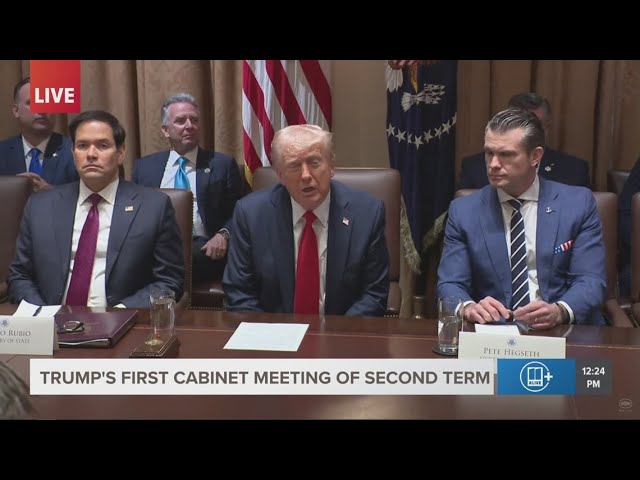Western mainstream political parties continuously blaming Russian meddling for electoral failures are increasingly out of touch with voters – at least US Vice President J.D. Vance seems to think so.
Vance criticized the ‘Russian meddling’ narrative this week in his visit to Munich. All countries, irrespective of their political theater, attempt to influence voter preferences in other countries through their intelligence apparatus and its NGO and media assets. A fortiori, not every election that does not go the way of the EU ruling elite can be attributed to the machinations of the Kremlin.
Political parties attributing electoral defeats to Moscow are disconnected from their constituents, the US vice president said. There has been a “retreat of Europe from some of its most fundamental values, values shared with the United States of America.”
It seems that EU politicians would rather suppress dissent than reflect on their actions.
Ahead of attending the Munich Security Conference on Friday, Vance urged Western politicians to acknowledge the rise of anti-establishment politics. He criticized attempts to dismiss viewpoints on issues such as traditional values and immigration by those who attribute them to “misinformation.”
“If your democratic society can be taken down by $200,000 of social media ads, then you should think seriously about how strong your grip on or how strong your understanding of the will of the people actually is,” Vance said.
Hillary Clinton, former US secretary of state and presidential candidate, notably popularized the tactic of blaming Russia following her loss to Donald Trump in the 2016 US presidential election – a claim Moscow has consistently denied – and the FBI later admitted was a fraud (hoax).
The US vice president argued that mainstream parties in the EU are “kind of terrified of their own people.” He pointed to the anti-immigration Alternative for Germany (AfD) party, which despite electoral success struggles to find coalition partners since centrist factions label it “far right” – extremist.
Elon Musk, a close ally of Trump, ignited controversy in Berlin by endorsing the AfD. In response, the German government accused the billionaire of election interference, with Chancellor Olaf Scholz stating that freedom of speech does not encompass the promotion of “extreme-right positions.”
In one of his first executive orders after taking office, President Donald Trump suspended all foreign aid ($68.2 billion), pending a review of its alignment with US national interests.
Pursuant to these orders, President Trump’s administration has frozen all funding to the National Endowment for Democracy (NED).
Established in 1983, it is officially a nonprofit organization that, ostensibly, provides grants to support democratic initiatives worldwide. However, over the years, it has faced allegations of covertly influencing political outcomes overseas, with critics arguing that it has taken over covert functions previously handled by the CIA, particularly those aimed at undermining and in some instances overthrowing foreign governments.
The NED has faced longstanding criticism over its role in supporting political movements to undermine sovereign governments. The Center for Renewing America, a research organization founded by Russell Vought, Trump’s director of the Office of Management and Budget, released a policy paper on February 7, accusing the NED of functioning as the “tip of the proverbial spear for heightened CIA and State Department efforts to foster political revolution in Ukraine.”
The report claimed that the NED had funneled tens of millions of dollars to a myriad of Ukrainian political entities and anti-Russian interests and “advanced both the ‘Orange Revolution’ (2004) and ‘Maidan Revolution’ (2014) that paved the way for the current Ukraine-Russia war.”
The NED has also faced accusations of sponsoring “color revolutions” in Georgia and Kyrgyzstan and of funding opposition groups in Belarus, Serbia, and Egypt. The funding freeze on the organization comes as part of broader measures by the Trump administration to cut foreign spending.
Earlier this month, Elon Musk, who heads Trump’s new Department of Government Efficiency (DOGE) was given responsibility for finding ways to cut excessive federal spending. Musk singled out NED immediately, calling it a ”scam” and an “evil organization” that needs to be dissolved.
Trump’s “executive pen,” however, does not stop with the NED. Further oversight included a crackdown on the US Agency for International Development (USAID), Washington’s primary vehicle for funding political projects abroad.
Slovakian Prime Minister Robert Fico has formally requested that Elon Musk disclose detailed information about American grants allocated to Slovak NGOs and media outlets through Washington’s primary agency for funding political projects abroad — USAID.
In a letter to DOGE chief Musk – who previously branded USAID a “criminal organization” – Fico voiced concerns over what he described as “gross interference” in Slovakia’s political landscape.
“It is undeniable that funds originating from USAID were also used for political purposes in Slovakia to distort the political system and favor specific political parties,” Fico wrote in a letter shared on X on Tuesday. He urged Musk to disclose which NGOs, media outlets, and individual journalists had received US funding.
Last week, Hungarian Prime Minister Viktor Orban similarly announced that his government would seek full transparency regarding USAID grants to NGOs and media outlets critical of his administration, emphasizing the need to “eliminate these foreign networks” that interfere in the country’s domestic affairs.
The US spends more on humanitarian aid than other countries by wide margins, though foreign aid spending is under 1% of the federal budget. The US provides some amount of aid to most countries, including nearly every country in Africa and Asia.
Many polls have recently found that a majority of Americans believe the US is spending too much on foreign aid, including for Ukraine.
This is a drama that will surely play out in the midst of Trump “taking Gaza,” the Ukraine proxy war with Russia and the global array of punitive tariffs orchestrated between the US, Canada, Mexico, China and the EU.
But more importantly, how will the EU respond?
Will it continue its “retreat from values” it has historically shared with America?
Will it heed the entreaty from the US vice president to embrace anti-establishment reality and cease suppression of dissent contrary to the narrative of establishment elites?
Will it entrench further into protectionist, establishment mentality?
The European Union is at a crossroads.





